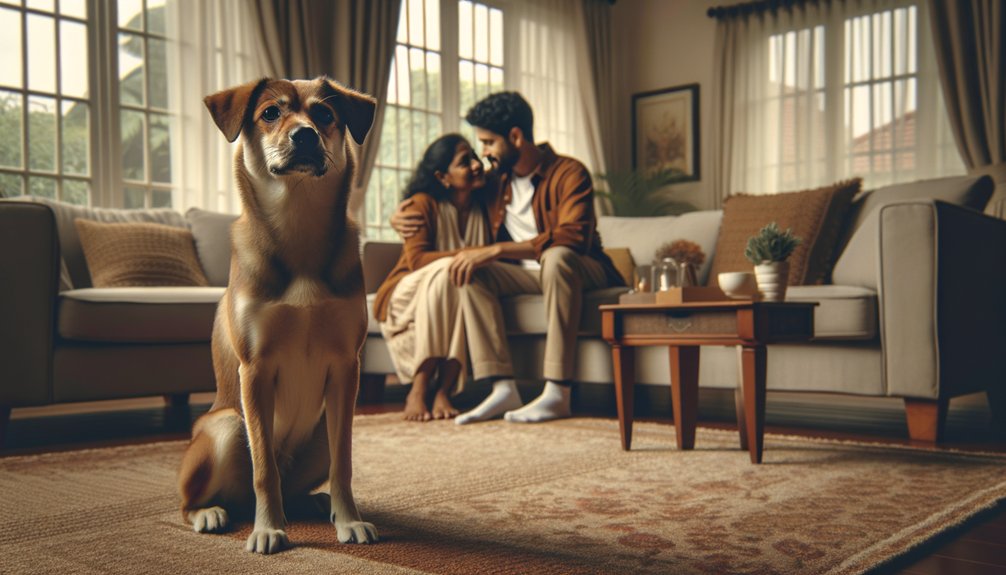Some dogs show jealousy around wives due to instinctual bonding and territorial feelings, but the reasons might surprise you—discover what truly sparks this behavior. You might notice your dog acting differently when your wife enters the room or gets your attention, and it’s not uncommon for dogs to display behaviors that seem jealous. This reaction often stems from their deep attachment to you and their instinct to protect their social bond. Understanding why your dog feels this way requires looking closely at how they perceive changes in attention and territory. Let’s explore what drives this jealousy and how it affects your dog’s behavior.
Key Takeaways
- Dogs see their owner as a primary attachment figure, so attention shifts to a spouse may threaten this bond, triggering jealousy.
- Jealousy arises from dogs’ instinctual need to maintain social standing and secure affection within their perceived pack hierarchy.
- Changes in routine or focus on the spouse can activate possessive behaviors as dogs try to protect their “territory” and resources.
- Signs like whining, following closely, or interrupting interactions reflect the dog’s attempt to regain the owner’s attention and reassurance.
- Inconsistent attention or lack of shared quality time with the spouse can exacerbate jealousy and possessiveness in dogs.
Understanding Canine Bonding and Attachment

Although dogs can’t express emotions like humans do, they form strong bonds and attachments with their owners that influence their behavior considerably. When you understand dog socialization, you realize these bonds develop through early interactions and ongoing experiences.
Dogs naturally look to establish a pack hierarchy, seeing their human family as their social group. You become an essential figure within that structure, providing security and guidance.
This attachment motivates their reactions, including protective or jealous behaviors. Recognizing your dog’s need for social connection helps you foster a healthy relationship that respects their instincts.
How Attention Shifts Affect Your Dog’s Behavior
The bond your dog forms with you influences how they respond when your focus shifts, especially toward others in the household. When your attention moves from your dog to your spouse, it can activate jealousy triggers rooted in your dog’s need for security and connection.
These attention dynamics play a vital role in your dog’s emotional state. Your dog may perceive the shift as a threat to their relationship with you, leading to behaviors aimed at regaining your focus.
Understanding these subtle changes helps you respond with empathy and structure, reinforcing your dog’s sense of belonging. By recognizing how attention shifts impact your dog, you can manage jealousy triggers effectively, fostering harmony and trust within your family environment.
Signs Your Dog Is Feeling Jealous
When your dog feels jealous, they often display specific behaviors that signal their discomfort and desire for attention. Recognizing these signs can help you respond with empathy and reinforce positive socialization techniques developed during puppy development.
Look for these common indicators:
- Clinginess or Following You Closely: Your dog may shadow you or your wife, seeking reassurance and inclusion.
- Whining or Barking Excessively: Vocalizations can express distress or a call for engagement.
- Interrupting Interactions: Attempting to insert themselves between you and your wife shows a bid for attention.
Understanding these behaviors helps you meet your dog’s emotional needs, fostering belonging and trust without reinforcing jealousy.
Early socialization techniques teach your dog healthy ways to cope, reducing jealousy-related behaviors over time.
The Role of Territory and Possessiveness in Dogs
Since dogs naturally view their environment and social connections as extensions of their territory, possessiveness often plays a critical role in their behavior. When your dog perceives you or your wife as part of its territory, it may exhibit possessive behavior to maintain its social standing and secure resources.
Territory marking—through scent or physical presence—is a way your dog communicates ownership and signals discomfort when it senses competition. This possessiveness can appear as jealousy when your dog feels threatened by changes in attention or affection.
Understanding this behavior helps you see your dog’s actions as rooted in instinctual needs for safety and belonging, rather than mere jealousy, fostering empathy and stronger bonds within your household.
Recognizing territory-related possessiveness is key to addressing your dog’s emotional well-being.
Strategies to Reduce Jealousy and Improve Relationships
Although jealousy in dogs can feel challenging, you can implement effective strategies to reduce these behaviors and strengthen your relationship with both your dog and your wife.
First, observe your dog’s body language closely to identify signs of jealousy like stiff posture or growling.
Next, use consistent training techniques that reward calm and positive interactions around your wife, reinforcing good behavior.
Finally, guarantee your dog receives equal attention and affection to minimize feelings of neglect.
- Monitor dog body language for early jealousy signals.
- Apply positive training techniques focused on calmness.
- Share quality time equally between your dog and wife.
These steps foster trust and belonging, helping your dog feel secure and valued within your family dynamic.



